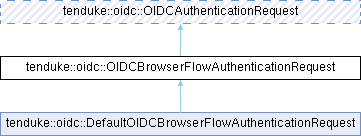|
10Duke Enterprise C++ SDK
|
|
10Duke Enterprise C++ SDK
|
#include <OIDCBrowserFlowAuthenticationRequest.h>
An OIDC-authentication request, which handles the OIDC-flow, authenticating the user with browser.
The request itself does not interact with any browser, but provides methods to handle the browser interaction.

Public Member Functions | |
| virtual std::string | buildAuthenticationRequestUrl () const =0 |
| Creates the initial authenticationrequest URL. | |
| virtual std::unique_ptr< tenduke::oidc::OIDCState > | handleCallback (const std::string &redirectURI) const =0 |
| Handles callback: performs consequent actions to authenticate. | |
|
pure virtual |
Creates the initial authenticationrequest URL.
Navigate browser to this URL.
Implemented in DefaultOIDCBrowserFlowAuthenticationRequest, and tenduke::oidc::DefaultOIDCBrowserFlowAuthenticationRequest.
|
pure virtual |
Handles callback: performs consequent actions to authenticate.
See documentation of method tenduke::oauth::OAuthRequest::handleCallback().
The call is synchronous.
| redirectURI | this is the redirect-URI to which the OIDC server requested the browser to navigate to after the login was successful or in case of some error. The redirect-URI contains all the necessary parameters to finalize the login |
| std::nested_exception | when the there is some nested cause |
| tenduke::http::HTTPException | (or subclasses of it) when the server responds with HTTP error status code which does not indicate OAuth-error, e.g. 500 (internal server error) or 404 (not found = wrong endpoint configured) |
| tenduke::json::JSONParsingException | when server response is not valid JSON |
| tenduke::oauth::OAuthException | when the server response is not what we expected, e.g.
|
| tenduke::oauth::OAuthServerError | when the server responds with an error |
| tenduke::net::NetworkingException | (or subclasses of it) when networking error occurred, e.g.
|
| tenduke::net::URLException | if problem parsing the redirectURI (should not happen, though) |
| tenduke::net::MalformedURLException | if the redirectURI is invalid |
Implemented in DefaultOIDCBrowserFlowAuthenticationRequest, and tenduke::oidc::DefaultOIDCBrowserFlowAuthenticationRequest.